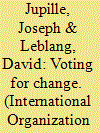|
|
|
Sort Order |
|
|
|
Items / Page
|
|
|
|
|
|
|
| Srl | Item |
| 1 |
ID:
080049


|
|
|
|
|
| Publication |
2007.
|
| Summary/Abstract |
A long tradition of research has shown decentralized political structures as an important cause behind lower levels of redistribution and higher levels of inequality. This article offers an alternative interpretation of the association between fragmented fiscal structures and higher levels of inequality. I argue that the distributive effects of decentralization depend on the preexisting territorial patterns of inequality. Therefore, the political choice between alternative fiscal structures is largely driven by their expected distributive consequences. As a result, the territorial structure of inequality becomes an important factor to explain why some fiscal structures are more integrated than others. Two mechanisms link regional income distributions and preferences about the decentralization of redistributive policy: differences in the demand for redistribution associated with interregional income differences, and differences in the demand for social insurance associated with the incidence of labor market risks. I test the argument using a data set of fourteen countries in the Organization for Economic Cooperation and Development (OECD) over the period 1980-2000. In addition, I illustrate the potential of the approach by analyzing why social solidarity remains territorially fragmented in the European Union despite the fact that it has a common currency and a common market
|
|
|
|
|
|
|
|
|
|
|
|
|
|
|
|
| 2 |
ID:
080046


|
|
|
|
|
| Publication |
2007.
|
| Summary/Abstract |
This article explores the constructivists' institutional socialization hypothesis, positing that intergovernmental organizations (IGOs) make member-state interests more similar over time, thus promoting interest convergence. We first show how this hypothesis can be tested systematically using relatively new data on dyadic interest similarity and joint structured IGO membership, and then we conduct a series of empirical tests. Our results show strong statistical support for the institutional socialization hypothesis, using both global and more restricted regional samples. We also demonstrate how our results are consistent with a longer-term socialization process and cannot be explained by the short-term effect of institutional information. Finally, we show some limits to the institutional socialization hypothesis. Unstructured IGOs reveal no effect in promoting member-state interest convergence. Following recent theory arguing that great powers in the international system often use IGOs for coercive means, we find that institutional socialization gets weaker as the power imbalance within the dyad grows
|
|
|
|
|
|
|
|
|
|
|
|
|
|
|
|
| 3 |
ID:
080047


|
|
|
|
|
| Publication |
2007.
|
| Summary/Abstract |
Preferential trade agreements offer members an alternative to dispute settlement at the World Trade Organization. This gives rise to forum shopping, in that complainants can file regionally, multilaterally, or not at all. What explains this choice of forum? I argue that complainants strategically discriminate among overlapping memberships: on a given measure(s), some prefer to set a precedent that bears only on a subset of their trade relations, others a precedent that bears on all their trade relations, while still others prefer not to set a precedent. Thus, the key to forum shopping is not simply which institution is likely to come closest to the complainant's ideal ruling against the defendant, but where the resulting precedent will be more useful in the future, enabling the complainant to bring litigation against other members, rather than helping other members bring litigation against the complainant. I consider disputes over Mexican brooms and Canadian periodicals
|
|
|
|
|
|
|
|
|
|
|
|
|
|
|
|
| 4 |
ID:
080045


|
|
|
|
|
| Publication |
2007.
|
| Summary/Abstract |
Theories of government-international court relations assume that judges share an interest in expanding the reach of their court. Yet, casual observation suggests that international judges vary in their activist orientations and that governments selectively appoint judges. This article explores a new data set of dissents in the European Court of Human Rights (ECHR) to estimate the ideal points of judges. The results show that activism-restraint is indeed the main dimension of contestation among judges. Variation in judicial activism cannot be accounted for by different legal cultures of judges or by levels of domestic human rights observance in the judges' countries of origins. Instead, aspiring European Union (EU) members and governments more favorably disposed toward European integration appoint more activist judges. These results imply that politics matters in the appointment of international judges and that EU expansion was an important driving force behind the ECHR's increased activism. More generally, the analysis suggests that agent selection is an important and understudied tool for influencing international organizations
|
|
|
|
|
|
|
|
|
|
|
|
|
|
|
|
| 5 |
ID:
080048


|
|
|
|
|
| Publication |
2007.
|
| Summary/Abstract |
Referendum votes on adoption of the euro in Denmark (2000) and Sweden (2003) provide unprecedented natural experiments through which to study the political economy of money. Using exit polling data and multinomial logit statistical models that allow us to separate preferences for the euro from preferences for the European Union (EU), we test economic "calculation" and political "community" as determinants of individual-level preferences over adoption of the euro. We find that "calculation" operates most clearly where, as in Sweden, the choice of a fixed versus a floating exchange rate regime is at stake, while "community" exerts strong effects across the two cases
|
|
|
|
|
|
|
|
|
|
|
|
|
|
|
|
|
|
|
|
|